Abstract
Environmental protection is one of the key challenges facing mankind today. Finding out what young people, referred to as Generation Z, think about this issue is extremely important, as they will be the first to experience the negative effects of environmental degradation. Research has shown that Generation Z has the greatest hope for solutions from the technological sphere. Thus, the economic and political spheres should support the development of technology in this area. The social sphere is rated lowest, which may reflect young people’s personal withdrawal and the delegation of responsibility for the environment’s future to engineers, entrepreneurs, and politicians. It is equally important to learn what constitutes an environmental imperative for Generation Z. It is based on new energy sources, energy producers, and the state’s pursuit of a policy of international cooperation in this area, supported by national legislative activity toward entrepreneurs and citizens. Research has demonstrated the need to raise awareness among young people, with a focus on individuals treated as subjects in their interaction with modern technology.
1. Introduction
The concept of sustainable development has evolved over the years. At the end of the 20th century, it was adopted by politicians as a leading model of social development. Ultimately, it encompasses social, economic, and environmental issues [1,2,3,4,5].
Environmental protection is essential for the survival of the human species. As a phenomenon stemming from the development of civilization, it is widely recognized and reported, indicating that it is constantly increasing [6,7]. Consequently, the seriousness of the problem calls for an in-depth analysis [8,9]. Environmental destruction is rated alongside disease, financial crises, and technology disruptions as a global challenge for humanity [10]. Environmental protection concepts should be based on comprehensive, coordinated, and long-term actions extending over several decades or longer [11,12]. Such perspective requires knowledge of the views of young people, who will be most affected not only by labour activity, but also by the consequences of addressing or ignoring this challenge [13]. Environmental risk is one of the four key issues Generation Z, born between 1995 and 2010 [14,15,16], will face in the next few decades.
Generation Z is positioned as the second youngest generation, between the Millennials, i.e., Generation Y born between 1981 and 1994 [17], and Generation Alpha, born after 2010 [18]. Generation Alpha is still too young to form mature and credible opinions, while Generation Y will gradually be replaced by Generation Z between 2030 and 2050. Representatives of Generation Z are often narrowed down to students [19]. This is mainly dictated by the fact that, in this case, we learn the opinion of a group of people, who, in addition to passively participating in a certain future, will influence this reality as political, economic, social, and technological decision-makers. They look broadly and boldly into the future, which is of considerable importance for future-related research [20]. Few detailed analyses have been conducted in this area [21,22,23,24,25,26].
Despite research stating that environmental issues are one of the most important ones that Generation Z is interested in [27,28,29], cares about, and takes various actions to impact it [30,31], young people’s attitude toward the future of the environment is ambiguous, which requires further research [27].
While looking at environmental factors, the authors of this article propose paying attention to the methodology of structuring the environment based on the STEP method (social, technological, economic, and political spheres), which is a widespread method used in various fields of research. This method is also known as PEST, extended as STEEP, and PESTLE. This approach identifies four areas of potential determinants from the social, technological, economic, and political spheres [32,33]. This type of analysis is most often used in management, but recently, this approach has been increasingly applied in the ecological field [34,35,36]. The classical approach based on the four spheres is sufficiently clear. The areas covered by this study are determined by area factors. Factors from individual areas are intended to determine the conditions of the approach to the natural environment in the following aspects:
- S—social, cultural conditions, population development, sense of security, community, and attitudes;
- T—conditions related to research and development activities, approach to technology, and innovation;
- E—impact of economic growth, external financing of investments, and new methods of managing organizations;
- P—impact of international and/or national institutions on the studied area.
Factors influencing environmental protection are presented and analyzed in numerous studies [37,38,39,40,41,42]. However, it makes sense to understand the opinions of young people about the future, i.e., about factors that will significantly affect the state of the environment in a few or several years’ time [43]. This means that the set of such factors is difficult to identify unambiguously, and forecasts based on them not only differ in this respect, but are also based on dissimilar assumptions [10,44,45].
The determinants of the future environment related to the impact of STEP factors identified above led the research team to formulate the following research questions:
- Which sphere (social, technological, economic, political) of environmental impact considerations is most important according to Generation Z?
- What imperative does Generation Z have toward the environment from the assessments presented?
2. Methods
In order to answer the above research questions, the author team adopted the following sequence [40,46,47,48,49]:
- 1.
- Defined the spheres covered by the study corresponding to the STEP method;
- 2.
- Generated area factors determining the respondent’s attitude. Based on the QUEST technique (Quick Environmental Scanning Technique) and the subject literature, seven key factors for each area were adopted;
- 3.
- Formulated research hypotheses;
- 4.
- Developed a survey questionnaire;
- 5.
- Conducted survey research. The studied community was narrowed to Generation Z because a research gap in this area was noticed;
- 6.
- Analyzed the received responses using GRM models.
- 7.
- On this basis, the imperatives that guide Generation Z were determined.
These methods have already been used in studies on the scope of sustainable development.
2.1. GRM Models
The General Regression Models (GRM) module is called a “general” regression program because it applies the methods of the general linear model, allowing it to build models for designs with multiple-degree-of-freedom effects for categorical predictor variables, as well as for designs with single-degree-of-freedom effects for continuous predictor variables. GRM implements stepwise and best-subset model-building techniques for Analysis of Variance (ANOVA), regression, and analysis of covariance (ANCOVA) designs. GRM uses the least squares methods of the general linear model to build models and to estimate and test hypotheses about effects included in the final model [50]. Unlike the multiple regression model, which is used to analyze systems containing continuous predictors, the general linear model can be used to examine any analysis of variance (ANOVA) system containing qualitative (categorized) predictors, any analysis of covariance (ANCOVA) system containing both qualitative (categorized) and continuous predictors, as well as any regression analysis model containing continuous predictors. Effects for qualitative predictors can be encoded in the experiment matrix, using a reparametrized model or a model with sigma-constraints [50].
The method of all possible regression subsets can be used in the process of finding the “best” possible sub-model as an alternative method or in combination with stepwise methods [51,52] to discuss the use of the all possible regression subsets method in conjunction with the stepwise regression method. This reasoning suggests that once a solution has been found by the STEP method, the “best” of all possible subsets with the same number of effects should be examined to see if the solution obtained by the STEP method is indeed the “best.” The article uses this approach. It is worth noting that several different criteria can be used to rank subsets of models in terms of “goodness”. The most commonly used criteria are the multivariate R-square (multivariate correlation coefficient), the corrected R-square, and Mallow’s Cp statistic. When using the method of all possible subsets of a regression, combined with the stepwise method, the multiple R-square allows for direct comparison of the “best” subsets found in each approach.
2.2. Representative Sample
The stated aim of the research and the testing of research hypotheses should take place under conditions of representativeness of the research sample (representative sample). Representativeness is the property of a research sample selected in such a way that the frequency and distribution of characteristics of the individuals included in it are a representation of the entire population under study [53,54]. The representativeness of a sample makes it possible to generalize the results of a survey conducted to the entire population and to calculate the statistical error to which these results may be subject.
The procedure for determining a representative sample involves three stages. Stage I is the definition of the population. Stage II is the definition of the margin of error and the confidence level. Stage III is the calculation of the sample size. The representative sample size, in case of an unlimited population, can be calculated with the following formula:
where
- n—sample size;
- —the value for the adopted confidence level (for it is 1.96);
- p—estimated population proportions;
- q—estimated population proportions for the complementary event (q = 1 − p);
- —margin of error (5%).
If the population size is limited, it is useful to use a finite population correction using the following formula:
where
- n′—adjusted sample size;
- N—population size.
2.3. Survey Form
The questionnaire was addressed to respondents who are representatives of Generation Z, i.e., people born between 1995 and 2010. People outside the adopted time range could not fill in the questionnaire. The survey was prepared in 2 languages: Polish and English. This solution was deliberately chosen in order to analyze the results of the survey: (1) for Poland (Polish language), (2) for non-Polish respondents (English language), and (3) jointly for all respondents. The following diagnostic elements were included in the survey form: respondent’s gender (female, male, other, do not want to indicate), respondent’s field education (economic, social, political science, technical/engineering, mixed), respondent’s type of work experience (economic, social, political science, technical/engineering, no experience, mixed), respondent’s continent of origin (Europe, Africa, South America, North America, Australia and Oceania, Asia), respondent’s civilizational (cultural) circle (Western, Orthodox, Latin American, Islamic, African, Indian, Chinese, Japanese).
The questionnaire form was prepared based on a content analysis of Generation Z’s attitudes toward the environment, taking into account four spheres: economic, social, political, and technological. In each sphere, seven questions were defined. It was conducted through the questions related to factors that were extracted from other studies [40,55,56], analysis of the literature [57,58,59,60], and a panel discussion. A 4-point response scale was used for each question: low, medium, high, and very high. Detailed diagnostic questions are included in column 1, Table 1, Appendix 1 [61] (All the appendices in the article have been published in an open data repository at ref. [61]).

Table 1.
Diagnostic and content questions, designation, and coding of variables.
The survey was conducted among students of the Academy of Economics and Humanities in Warsaw (AEH) in all fields, forms, and levels of study. The selection of AEH students was based on several substantive and technical assumptions:
- AEH is the most internationalized university in Poland [62], with students from 124 countries around the world (around 5800) [63];
- The authors of the survey had access to the entire Generation Z community from AEH.
The developed survey form was made available to respondents on MS FORMS between 12 December 2023 and 17 June 2024.
The research assumes that a perspective of several years (European Green Deal—2030—reduction in emissions by 50%) and several decades (European Green Deal—2050—climate neutrality) determines the opinion of the generation that will be the main beneficiary, but also the implementer of actions related to limiting the greenhouse effect on the Earth. It is, therefore, the “Z” Generation, as the youngest generation already possessing the knowledge as well as the experience to assess the phenomenon under study. In the target year of 2050, they will be the 40- and 50-year-old generation, so that the economic, social, and political effort associated with achieving the intended environmental goals will rest on their shoulders throughout this period. The survey asked for an assessment of processes that are already underway and will have an impact in the future. Specific factors and processes regarding the climate targets set were not asked about. There were no questions about the degree of achievement of a specific target. No future framework was specified, although the fact that these factors are already ongoing means that they are known to respondents. No questions were asked about factors and processes that are yet to come, as they are fraught with difficulty in determining the probability of not only their occurrence but, perhaps most importantly, the degree of environmental impact.
2.4. Characteristics of the Survey Data
A total of 1434 respondents took part in the survey. This group included 102 people who did not meet the age requirement, i.e., they were born before 1995. As a result, a total of 1332 responses to the survey were considered valid. Table 2, Figure 1 and Figure 2, and Appendix 2 (Figure 1 and Figure 2) [61] provide background information on the variable. The operationalization of the variables is described in Section 3.1.

Table 2.
Variable D1 and D2—statements of volumes.
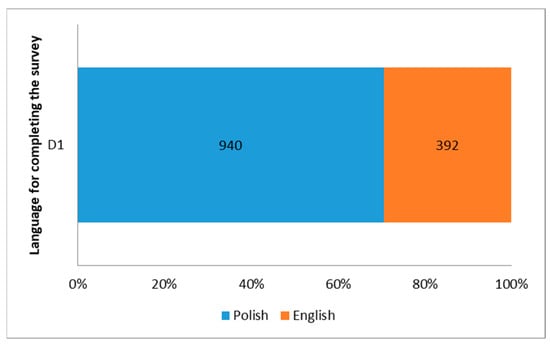
Figure 1.
Basic numerical data for variable D1. Source: own study.
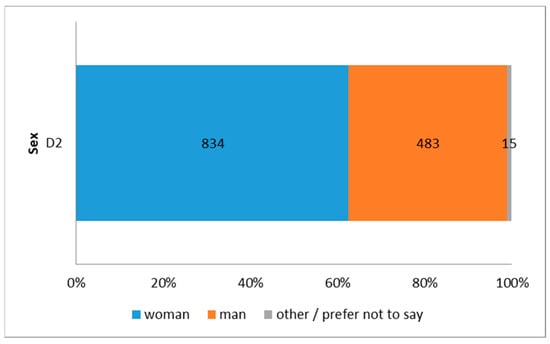
Figure 2.
Basic numerical data for variable D2. Source: own study.
3. Research Results
3.1. Characterization and Operationalization of Variables
In Appendix 1 [61], detailed analyses were performed on the operationalization of the variables. The data used in the analyses in this paper are summarized in Appendix 3 (some of the data) [61]. Basic descriptive characteristics were prepared for the set of variables. Basic descriptive statistics are summarized in Appendix 4 [61]. Appendix 5 [61] presents descriptive statistics—data summary and graphs.
The presented analysis aims to identify the underlying qualitative relationships that exist in the data extracted from the survey. The analysis draws on the information contained in the data presented in Appendices 2 and 5 [61].
From the analysis in Figure 3 (Appendix 2) and the corresponding figures for variable D3 in descriptive statistics—data summary and graphs, it should be noted that respondents represented different fields of education, with a predominance of economic and social education. The analysis in Figure 4 (Appendix 2) and the corresponding graphs for variable D4 (Appendix 5) show that the respondents had different work experiences. Among the respondents, there were also some who had no work experience, which is natural for Generation Z. Therefore, considering variables D3 and D4, attitudes of varying education and work experience are represented in the survey, making it possible to identify different attitudes and perspectives on the environment.
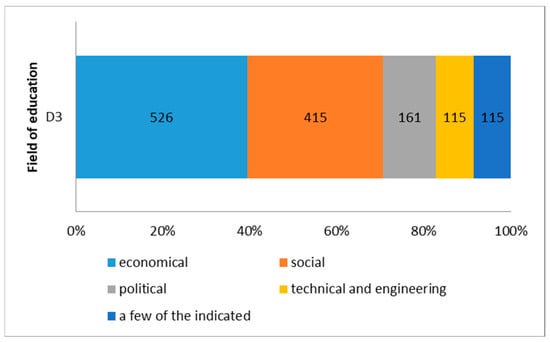
Figure 3.
Basic numerical data for variable D3. Source: own study.
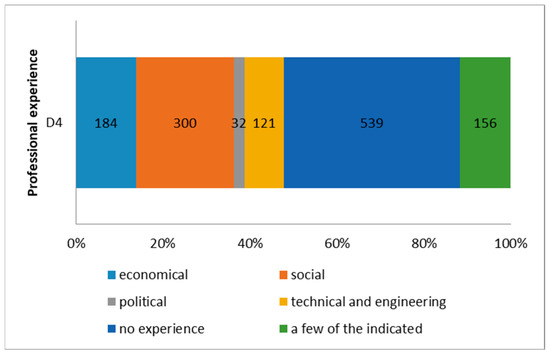
Figure 4.
Basic numerical data for variable D4. Source: own study.
The analysis of the data in Figure 5 and Figure 6 (Appendix 2) and the corresponding graphs for variables D5 and D6 (Appendix 5) allows for the conclusion that the respondents were from different parts of the world, i.e., different continents, and represented different civilizational (cultural) circles. Obviously, due to the location of the surveyed population—Poland—the predominant group of respondents were Europeans and people identifying themselves with the Western civilizational (cultural) circle. Respondents from other civilizational (cultural) circles also took part in the survey: Asians (Asian civilizational circle), Africans (African civilizational circle), and representatives of other continents and civilizational circles. Owing to the presented structure of the respondents’ origin and representation of different civilizational (cultural) circles, the results obtained may be generalized, at least to the level of Poland and Europe.
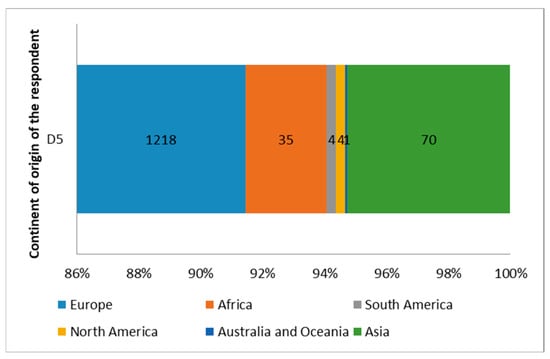
Figure 5.
Basic numerical data for variable D5. Source: own study.
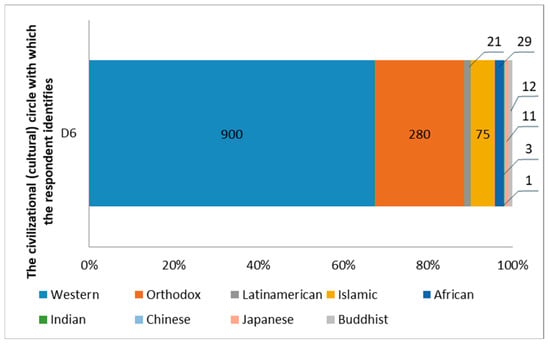
Figure 6.
Basic numerical data for variable D6. Source: own study.
Appendix 2 [61] summarizes the basic figures for all variables with a detailed analysis (Figure 7, Figure 8, Figure 9, Figure 10 and Figure 11).
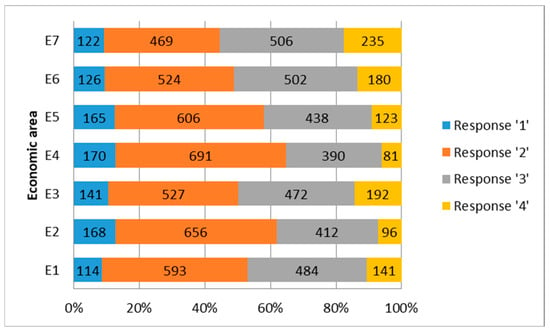
Figure 7.
Basic numerical data for variables E1–E7. Source: own study.
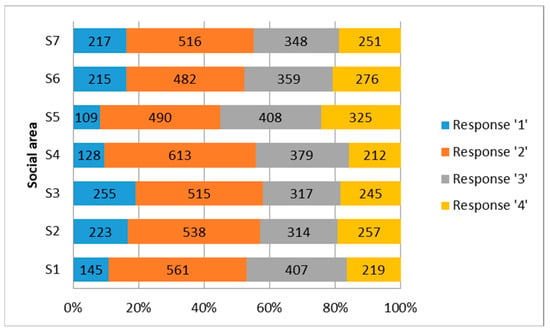
Figure 8.
Basic numerical data for variables S1–S7. Source: own study.
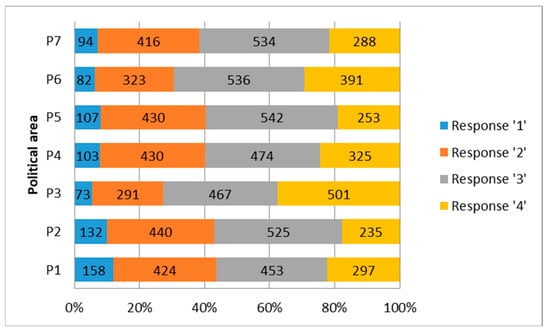
Figure 9.
Basic numerical data for variables P1–P7. Source: own study.
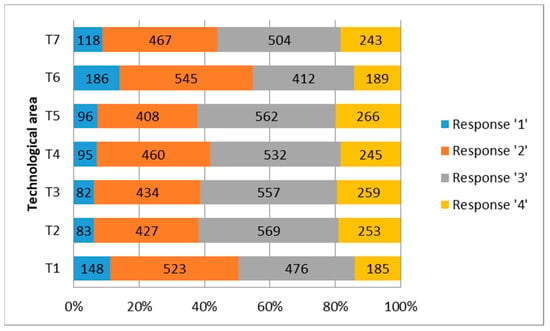
Figure 10.
Basic numerical data for variables T1–T7. Source: own study.
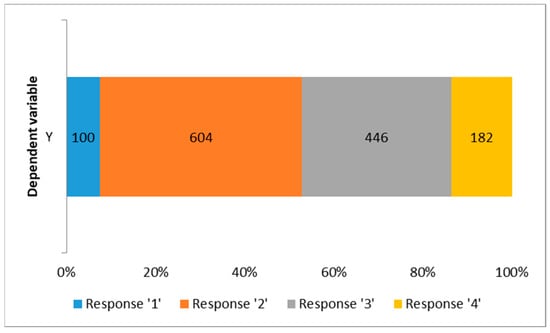
Figure 11.
Basic numerical data for variable Y. Source: own study.
3.2. Quantitative Analysis of the Results
3.2.1. Model Used
All analyses were performed using Statistica (Data Analysis Software System), version 13, TIBCO Software Inc. San Ramon, CA 94583, United States [50].
In order to verify the individual hypotheses, a GRM (General Regression Models) model without free expression (no intercept) was built based on the relevant set of independent variables. In addition, cluster analysis was performed in selected cases using the agglomeration method. Ward’s method was applied; Euclidean distance was used as a distance measure. For selected cases, Spearman’s Rho coefficient analysis was used—Appendix 6 [61].
The purpose of constructing individual models was to analyze the relationship of variables, not to build predictive models. According to the assumptions made, in the analysis of the built diagnostic models, less importance was attached to the assessment of the quality of the built models (R, R2, adj. R2, SS, F, p-values). The significance of the entire model was taken into account, indicating only those cases in which the model proved statistically insignificant. In contrast, the significance of individual variables was used for the analyses. In practice, either the lack of significance of variables or the specific contribution of individual variables to a given model was subject to analysis. As part of the model-building and analysis, a significance level was assumed at α = 0.05. All 1322 observations were analyzed, unless a particular analysis was based on only a subset (e.g., only level 1 for variable D1).
3.2.2. Hypothesis Testing
The hypotheses adopted were operationalized by using variables from all spheres (E, T, S, P) (Table 3).

Table 3.
Operationalization of main hypothesis HG *.
- (1)
- HG21 Verification
A GRM model without free expression (no intercept) was constructed based on the independent variables from sphere E. The variable Y was used as the dependent variable. Details of the model estimation are presented in Table 4a,b and Appendix 7 [61]. Based on the analysis of the data in this appendix, it can be concluded that the model and the variables in the model are statistically significant. The variables do not have the same effect on the dependent variable. Hypothesis HG021 should be rejected, and the alternative HG121 should be accepted, thereby recognizing that respondents differentiate the effect of individual independent variables from the E sphere on the Y variable.

Table 4.
(a) Details of GRM model estimation for hypothesis HG21—model parameters. Source: own study. (b) Details of GRM model estimation for hypothesis HG21—variable parameters. Source: own study.
They attribute the greatest impact to variable E1 (economic incentives (e.g., state subsidies, tax breaks) are able to change people’s behavior and actions toward environmental change), followed by a group of variables with similar impacts: E2 (consumer awareness/purchasing will be shaped by a culture of sharing /sharing economy of products/services), E4 (there will be a decoupling of economic growth (GDP) from predatory exploitation of the environment), E6 (the economy will move towards a closed loop (GOZ, circular economy), with the aim of reducing waste and wastefulness), and E7 (the economy will pursue environmental goals). They attribute a smaller impact to variable E3 (reductions in material and energy consumption resulting from environmental deficits will impair economic performance) and the smallest to E5 (efforts and actions to reduce the level of economic consumption of environmental resources will be effective).
- (2)
- HG22 verification
Constructed GRM model without free expression (no intercept) based on independent variables from the T-sphere. The Y variable was used as the dependent variable. Details of the model estimation are presented in Table 5a,b and Appendix 7 [61]. Based on the analysis of the data in this appendix, it can be concluded that the model and the variables in the model are statistically significant. The variables do not have the same effect on the dependent variable. Hypothesis HG022 should be rejected, and the alternative HG122 should be accepted, thereby recognizing that respondents differentiate the effect of individual independent variables from the T domain on the Y variable.

Table 5.
(a) Details of GRM model estimation for hypothesis HG22—model parameters. Source: own study. (b) Details of GRM model estimation for hypothesis HG22—variable parameters. Source: own study.
They attribute the greatest impact to variable T2 (technological solutions to environmental problems will be based on new energy sources) and T3 (environmental protection will be based on modern energy producers), followed by a group of variables with similar impacts: T4 (environmental protection will be based on energy storage), T5 (environmental protection will be based on new ways of energy transmission), and T7 (modern equipment in households and businesses will influence the way the environment is used). They attribute the least impact to variables T6 (mankind will overcome environmental crises through invention) and T1 (environmental crises are the initiator of disruptive changes for mankind in the area of technology).
- (3)
- HG23 verification
Constructed GRM model without free expression (no intercept) based on independent variables from the S-sphere. The Y variable was used as the dependent variable. Details of the model estimation are presented in Table 6a,b and Appendix 7 [61]. Based on the analysis of the data in this appendix, it can be concluded that the model and the variables in the model are statistically significant, except for variable S7. Variable S7 was removed from the model, and a new model was built for six variables, omitting Variable S7 from this analysis. The variables do not have the same effect on the dependent variable. Hypothesis HG023 should be rejected, and the alternative HG123 should be accepted, thereby recognizing that respondents differentiate the effect of individual independent variables from the S domain on the Y variable.

Table 6.
(a) Details of GRM model estimation for hypothesis HG23—model parameters. Source: own study. (b) Details of GRM model estimation for hypothesis HG23—variable parameters. Source: own study.
They attribute the greatest impact to variable S5 (care to minimize ecological and material footprint contributes to environmental protection). Then, there is a group of variables with a similar impact: S1 (in the designated time horizon, development will be determined by the finiteness of the Earth’s environmental resources) and S4 (long-term and laudable assumptions of environmental constraints conflict with our feelings, striving, weaknesses, and directed instincts). They attribute the least, though similar, impact to variables: S6 (as wealth increases, environmental awareness increases), S2 (stabilizing world population (population growth) will reduce environmental damage), and S3 (humanity is able to change its behavior so as not to create an environmental crisis).
- (4)
- HG24 verification
The GRM model was constructed without free expression (no intercept) based on the independent variables from the sphere P. The variable Y was used as the dependent variable. Details of the model estimation are presented in Table 7a,b and Appendix 7 [61]. Based on the analysis of the data in this appendix, it can be concluded that the model and the variables in the model are statistically significant. The variables do not have the same effect on the dependent variable. Hypothesis HG024 should be rejected and the alternative HG124 should be accepted, thereby recognizing that respondents differentiate the effect of individual independent variables from the P-sphere on the Y variable.

Table 7.
(a) Details of GRM model estimation for hypothesis HG24—model parameters. Source: own study. (b) Details of GRM model estimation for hypothesis HG24—variable parameters. Source: own study.
They attribute the greatest impact to variable P3 (states should actively cooperate internationally to protect the environment) and P6 (the state should promote environmental protection through appropriate laws for citizens and businesses). This is followed by a group of variables with similar impact: P4 (to protect the environment, deep reforms of the democratic system are needed, including reducing the influence of corporations on politics), P7 (cooperation with local governments and citizens is important, but the government should continue to play a role in shaping environmental policy), and P5 (democracy can foster the environment with informed public involvement). They attribute the least influence to variables: P2 (ideologies should take environmental issues into account) and P1 (the environment should be a priority on political parties’ agendas).
- (5)
- HG25 verification
A GRM model without free expression (no intercept) was constructed based on independent variables E1–T7. The Y variable was used as the dependent variable. Details of the model estimation are presented in Figure 12 and Figure 13, Table 8a,b, and Appendix 7 [61]. Based on the analysis of the data in this appendix, it can be concluded that the model is statistically significant, while some variables in the model are not statistically significant. Therefore, the original model was modified. A backward stepwise regression mechanism (with F = 1) was used to remove statistically insignificant variables. The results for this model were recorded in Appendix 7 [61]. The model included 18 of the 28 variables.
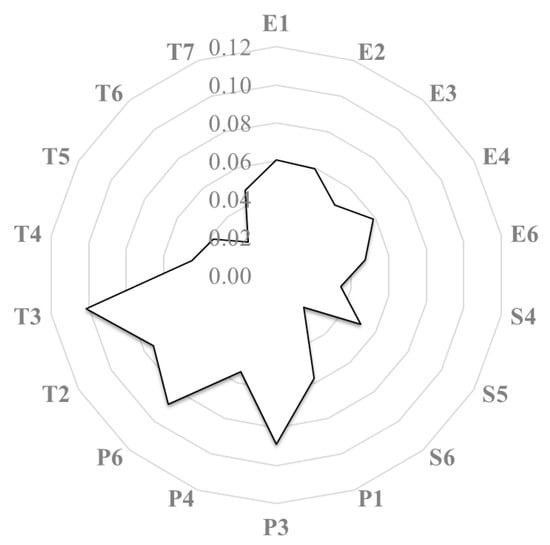
Figure 12.
GRM model estimation for hypothesis HG25—summary of significant factors. Source: own study.
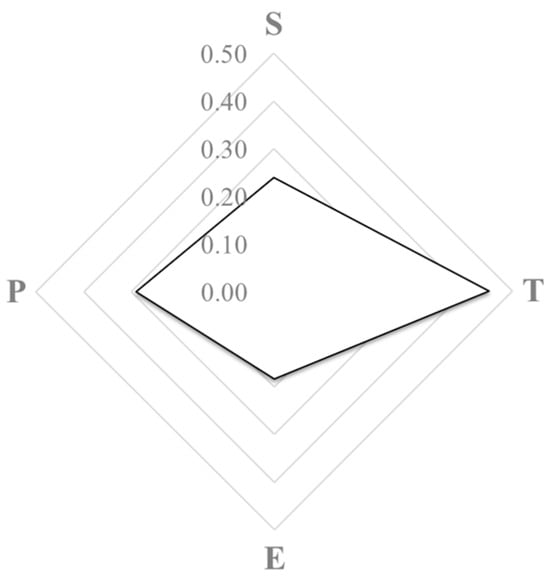
Figure 13.
GRM model estimation for hypothesis HG25—summary of factors relevant to STEP groups. Source: own study.

Table 8.
(a) Details of GRM model estimation for hypothesis HG25—model parameters. Source: own study. (b) Details of GRM model estimation for hypothesis HG25—variable parameters. Source: own study.
The analysis of the data shows that the variables do not have the same effect on the dependent variable Y. Hypothesis HG025 has to be rejected, and the alternative HG125 has to be accepted, thereby recognizing that respondents are influenced differently by the individual independent variables. The variables perceived this way can be used for the purpose of picking out imperatives arising from Generation Z attitudes.
Considering the influence of the individual variables on the dependent variable Y, it is possible to identify those variables that can be the basis for creating imperatives. These variables, according to their influence, are shown in Table 9.

Table 9.
Factors covered by the GRM model.
- (6)
- HG11 verification
The model built for hypothesis testing, HG25, was used to analyze this hypothesis. The cumulative impact of the variables for each sphere was determined: E, S, P, and T. On this basis, hypothesis HG11 was verified. The greatest impact was attributed to the T sphere (about 33%), followed by P (about 29%), E (about 27%), and S (about 11%). Taking this approach, hypothesis HG011 should only be partially confirmed. The influence of the variables E and P is different from that assumed in HG011. According to the model, the order of influence on the variable Y is as follows: T, P, E, S.
To confirm the analyses concerning hypotheses H4, a cluster analysis was prepared using the agglomeration method. Ward’s method was used; Euclidean distance was used as the distance measure. A hierarchical tree diagram is shown in Figure 14.
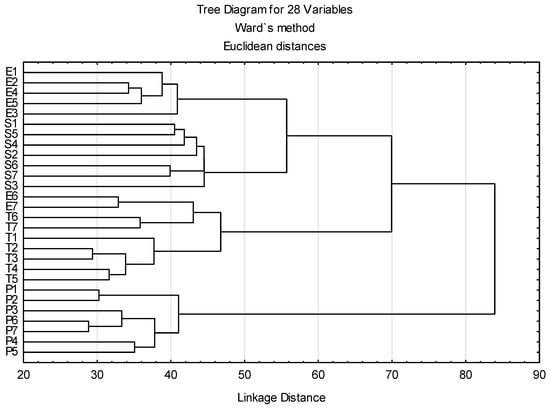
Figure 14.
Agglomeration method—hierarchical tree diagram for variables E1–T7. Source: own study.
The analysis of the data in Figure 14 shows that the variables from each sphere form distinct groups—almost homogeneous within each sphere. The agglomerations for the P and T spheres run at a lower binding level, i.e., the variables are located closer in the agglomeration space. It is not clear from the graph which of the spheres is more important or less important.
Robustness tests are all about assumptions. Every empirical analysis that you could run depends on assumptions to make sense of its results. It is impossible to avoid assumptions, even if they are pretty obviously true. Assumptions are important; thus, we must make them. But then, what if, to our shock and horror, those assumptions are not true? In that case, our analysis would be wrong. That is what robustness tests are for. We are worried whether our assumptions are true, and we devised a test that is capable of checking either (1) whether that assumption is true, or (2) whether our results would change if the assumption were not true. Robustness tests often examine hypotheses of the format: H0: The assumption made in the analysis is true; H1: The assumption made in the analysis is false. This tells us what “robustness test” actually means—we check if our results are robust to the possibility that one of our assumptions might not be true. Thinking about robustness tests in this way—as means of evaluating our assumptions—gives us a clear idea of how to use them [64].
The assumptions in the GRM model are based on the classical multiple regression model. In the robustness test model-building procedure, MRM (Multiple Regression Model) models without free expression (no intercept) were used (Table 10). Details of the estimated models are included in Appendix 8 [61].

Table 10.
Robustness Tests for Specific Research Hypotheses.
The data in Table 10 show that the alternative MRM model confirms the validity of the assumptions made in the GRM modeling framework. The assessment of the compatibility of hypotheses and assumptions showed compatibility in five analyzed models. Robustness tests confirm the validity of the assumptions made in GRM models. These results indicate that GRM models are not subject to unrealistic and unverifiable assumptions.
4. Discussion
4.1. In Search of a Key Sphere
This research revealed that the most important role assigned to Generation Z is in the technological sphere. However, it is interesting to note that this sphere valued the lowest factors, which may indicate that crises will not have an initiating effect on the development of technology, and that technology will not influence the prevention or reduction in the effects of such crises. If we assume that crises create the greatest uncertainty in the development of technology [65,66], it can be concluded that the highest valuation of this sphere is precisely due to the assignment of the greatest certainty to it. At this point, it is difficult to conclude whether this certainty is based on knowledge, a hunch, or belief. Certainty may also signify Generation Z’s optimism about the further development of technology and its impact on the environment. The dominant role of technology in this case can be referred to as technological determinism [67]. The choice of a younger generation that represents more knowledge and experience in many areas of modern technology than their parents and grandparents makes it possible to grasp the future of the issue under study [68,69]. It is not without reason that Generation Z is often referred to as Digital Natives, i.e., those who feel most at ease in the area of modern technology [70,71]. For this reason, Generation Z proposes new ways of thinking about how technology can be effectively used [72].
The order of the next two spheres may suggest that the source of such technological development may be politically and economically driven. This may be due to the belief that technological solutions are determined by cost-effectiveness and economic competitiveness [73,74]. However, in Generation Z’s view, regulations stemming from the political sphere have slightly more impact on the future of the environment than the economy. After all, the state’s (government’s) higher-rated role in environmental protection—whether in the international arena or domestic politics—stems from legislative activity [75].
In the economic sphere, economic incentives for citizens and consumer awareness scored highest, which may indicate that awareness is largely built by financial incentives [76]. The dominant position of the technological sphere here and the strong link between technology development and economics has its reference in the technological paradigm [77,78,79].
What is very telling is the three times lower valuation of the strength of influence of the social sphere in comparison to the technological sphere when considering the future of environmental protection. This may confirm the above conclusions about the primacy of the impact of technology development on the future of the environment, supported by legislative and market initiatives. However, it may also indicate that solutions to environmental problems have been delegated to technology and the actions of politicians, civil servants, and entrepreneurs supporting its development. This mode of inference will also appear when characterizing the context of the imperative.
4.2. In Search of an Imperative
Imperative as something extremely important or urgent [80] or as command, rule, duty, etc., which is very important or necessary [81], can characterize Generation Z’s approach to environmental protection. It can be derived directly from the highest valued factors by inferring directly with the GRM model what is important to Generation Z. Consequently, the picture of the imperative is not distracted by too many factors coming from different spheres that are taken into consideration. Even so, it is still difficult to construct the logical content of the imperative. The author team, therefore, proposes to narrow down the considered sets of the GRM model to two snapshots.
The four-factor imperative, which is the most straightforward, indicates that Generation Z believes that the greatest environmental impact will come from new energy producers and new sources of energy generation, supported by an active policy of international cooperation between states and by domestic policies aimed at creating appropriate laws for businesses and citizens. The broadest imperative context of nine factors shows a range of actions in the political and economic spheres supporting a key actor in his or her innovative functioning.
According to Generation Z, the essence of the imperative that constitutes the solution to the environmental problem is based on the development of technology supported by appropriate state policies and economic mechanisms. Table 11 illustrates the nature of the four most highly positioned factors globally and locally that describe the Generation Z imperative.

Table 11.
The nature of the four key factors building Generation Z’s imperative for the future of environmental protection.
Based on the way Table 11 presents Generation Z’s imperative, it is possible to distinguish the area of technological revolution, which will mainly concern new energy sources, and technological evolution observed by new energy production actors. It also follows that the new energy sources will be based on international cooperation, while the modern energy production actors will be stimulated by domestic state policies.
4.3. Sources or Contexts of the Imperative
The next research step after defining the imperative is to find out the origins of the imperative. In this case, the context of the imperative can be constructed based on inference at several levels that form the basis for discussion. These levels are derived from the adopted criteria that Generation Z respondents may have used to determine the strength of influence of particular factors on the future of the environment. The proposed imperative contexts describe the criteria, in turn: knowledge or degree of intuition, delegation of responsibility or personal commitment, and optimism or pessimism. It is an approach based on paradoxes that allows for extensive inference contained between two seemingly mutually exclusive or contradictory approaches. This way, the contexts allow for a complex view of different reasons for the judgements made, which form the imperative.
The contexts call for a broad view of the imperative by taking into account the GRM model, which covers 53% of all factors examined, or 18 of the 34 variables. This makes it possible to see two correlations. The first is related to the occurrence of several factors in groups directly next to each other. In this case, it can be seen that the factors of the technological and social spheres appear individually (except for T4 and T5). In contrast, the factors of the political and economic spheres appear in groups of two–three next to each other, which can be described as being more homogeneous. The second relationship takes into consideration the number of factors of specific spheres included in the model. The largest numbers are the economic (6) and technological (5) factors in the model, while the smallest are the political (4) and social (3) ones. The criterion understood in this way made it possible to position the factors covered by the GRM model in the form of a matrix (Table 12).

Table 12.
Context of the imperative considering the numerical and homogeneous occurrence of factors.
4.3.1. Knowledge Criterion
When there is a single occurrence of factors of a specific sphere in the GRM model, they are more pronounced, and this may indicate informed judgements based on knowledge and experience. In contrast, the close occurrence of factors of a specific sphere, defined in the research as homogeneity, may mean that they are perceived similarly. In this case, the blurring of assessments may be due to a lack of knowledge of a specific topic. Taking this way of thinking, the criterion of homogeneity of occurrence in Table 13 can be interpreted by the level of knowledge and experience possessed. Accordingly, it can be concluded that Generation Z has the greatest knowledge in the technological and social spheres. In the former area, this is due to a strong interest in technology [82], while in the latter area, it is due to direct experience of social problems on a daily basis [83]. In contrast, young people have the least knowledge and experience in the political and economic spheres [84]. This vague, general view of types of spheres also results in more fuzzy assessments of these factors, which manifests itself in their group perceptions (political factors P3, P6, and P1, P4; economic factors E1, E2, E4, and E3, E6). In the technological sphere, only two factors occur side by side, which concern the issue of energy storage and energy transmission (T4, T5). This may indicate the smallest knowledge of respondents on this very topic. Looking for the sources of this exception concerning the technological sphere, one can point to the fact that these are the least discussed issues in the media, and a low understanding of such solutions by young people. This can also be explained on a social level. Young people are not interested in saving [85], which translates into a lack of interest and, therefore, a lack of understanding of the storage concept. Young people also understand physical phenomena less, including the rules governing the transmission of energy and information. This can also be seen as a result of the dominance of the virtual world over the physical world in the minds of young people [86].

Table 13.
Context of the imperative considering the degree and sources of optimism of Generation Z toward the future of the environment.
In turn, the criterion of the number of occurrences in the GRM model presented in Table 12 is proposed to be interpreted by the degree of concentration of attention on a specific issue. According to this assumption, the more numerous the set of specific factors in the model, the greater their importance according to young people. High valuation in this case is accompanied by the belief in the significance of a specific phenomenon. Therefore, factors not included in the model constituted either unimportant issues or testified to the difficulty of their unambiguous assessment by young people. It should be noted here that the importance of a specific factor is not the same as the strength of the impact on the environment that young people assessed.
The extracted knowledge criterion and the weighting criterion are shown in Table 14.

Table 14.
Imperative context considering young people’s knowledge and attention.
4.3.2. Optimism Criterion
The future of the environment can be seen as a challenge along the lines of MoonShot, when the 1960s were the challenge of the Baby Boomer generation (born between 1946 and 1964) [87]. Environmental protection is also a major challenge in which technological solutions will play a key role [88,89]. Consequently, the environmental imperative can also be considered in terms of opportunity or threat [90]. In such an inference, the strength of influence of specific sphere factors indicates the hope pinned on the future of the environment. This means that young people see the greatest opportunities for the future of the environment in the development of technology, supported by human activity in the political and economic spheres. On the other hand, in the social sphere, Generation Z sees many threats. Table 13 shows such a relationship equating the strength of influencing factors with the level of environmental optimism [43]. In that case, the sources of evaluation can, in turn, tell us about the basis of the optimism, limited optimism, or pessimism represented by young people (Table 13). It turns out that both the greatest optimism and the greatest pessimism result from respondents’ knowledge. On the other hand, limited optimism is based more on young people’s intuition.
The typology presented in Table 13 can provide a general characterization of young people’s attitudes toward the environment. It is based on the sources, level, and type of optimism of young people regarding a key issue for the survival of the “last generation” [91]. Generation Z is rather optimistic about the future of the environment. Pessimism is only evident in a few social factors. Pessimism about climate change is an area of interesting research [92]
Generation Z’s mainly technology-based optimism can be explained by being brought up and growing up in a world where more and more problems concerning human life on Earth are solved by technology [93,94]. This diminishes the role of factors from other spheres, albeit political and especially social ones. This, in turn, casts doubt on the credibility of Greta Thunberg’s activism aimed mainly at politicians, as this may not reflect the views of Generation Z respondents presented in the research [95].
4.3.3. Criterion of Delegation of Responsibility
By narrowing the focus to only the first three factors of the GRM model, it is possible to see that the main stakeholders responsible for the future of the environment are economic and political actors. This shows not only that this is important for Generation Z, but also that environmental responsibility is delegated to others. According to this attitude, the role of engineers, inventors, entrepreneurs, and politicians is to shape the future of the environment. If this is the case, the complete absence of social factors not only in the four-factor imperative but also in the broadest nine-factor imperative, as well as their smallest share in the GRM model, only confirms that respondents are guided by such a criterion. The low personal involvement of Generation Z in environmental issues, as shown in this way, is expressed in the redirection of efforts to solve environmental problems to others, to political, economic, and technological actors and processes.
The sources of this attitude among young people can be considered in two ways. Arguably, the main reason is that young people are being catered to by older generations, particularly their parents. Nowadays, however, the generation of young people is increasingly being counselled by technology [82]. Interactive electronic communication is an expanding set of actors other than the family, from influencers and politicians, through journalists and experts, to terrorist and criminal organizations. All these actors in the media create the appearance of not only taking an interest in but also solving the relevant problems of young people. The recent processes following very clearly from the social to the political and economic spheres in platforms such as Facebook or X generate a significant risk that Generation Z will show less and less willingness to engage physically, with virtual engagement compensating for this lack. Digital (network) technology is taking over functioning in other spheres, not only the social as before, but increasingly in the political and economic spheres as well.
4.4. Methodological Limitations
Although this study is statistically representative of the student population, it is, nevertheless, necessary to be sufficiently cautious about the conclusions drawn. This is due to a number of important limitations of this research, several of which are imperative to bear in mind. First of all, the students themselves decided to participate in this study, which does not constitute a random sample. Nevertheless, it was important that a categorization was imposed on the young respondents looking at the complex future of the environment. Consequently, they had to take a comparative view of the different spheres constructed from already defined factors. This solution has weaknesses and strengths. The structuring of knowledge, which allowed for the content of the imperative to be clarified, should be considered a strength.
On the other hand, the complexity of finding the sources of the assessments made by the respondents should be considered a weakness. Generating the factors by the respondents themselves would, perhaps, have resulted in greater understanding and identification by young people, but on the other hand, it would have made the analysis more complicated and diffuse. Representativeness in terms of, for example, students’ social background or economic situation was also not ensured. One of the risks identified in this article is the issue of cultural generalizability risks. In this regard, we define a research limitation that the results obtained should be analyzed in the context of the surveyed group of respondents. The authors assume that future research should include non-student youth groups (e.g., employed young adults) and comparative East Asian/African cohorts.
Finally, it should be noted that, while on the one hand, students are a particularly desirable type of respondents in forward-looking research, on the other hand, the entire generation of young people—including the less educated—is not taken into account, which may distort the obtained research results and indicate the required caution in formulating generalizations and conclusions.
5. Conclusions
This research revealed that Generation Z is interested in the future of the environment. It attributes the most important role in shaping the future to technology, followed by the factors, processes, and actors of the economic and political spheres. The social sphere was rated lowest. This may indicate that young people do not show a willingness to become personally involved in solving these problems or lack the belief that they could influence the decision-making process. According to this attitude of Generation Z, environmental problems should primarily be solved by others—governments and politicians on a global and national scale, as well as engineers and entrepreneurs. Generation Z, despite a common belief, as evidenced by the activities of Greta Thunberg, is not interested in being personally active in this area. The main reasons for this attitude among young people can be seen in the role that digital technology plays in the lives of this generation, creating dangerous confidence in its causality and omnipotence. On the other hand, however, this may reflect a lack of feeling about such a threat, expressed in a low personal commitment to take their own actions toward bettering the environment. Or it could be interpreted in yet another way—the digital world isolates the younger generation from the natural environment to such an extent that this generation perceives nature in a distorted way and, thus, also fails to perceive this threat. It is interesting and worth further research to draw attention to yet another reason for the low valuation of the social sphere. It may result from climate anxiety as a psychological reaction to threats to the natural environment [92].
Generation Z does not feel the pressure of the imperative. Distance and indifference to the threat are not necessarily the result of underestimating it. The imperative is an expectation of technological and political solutions supported by the economy. Generation Z can be considered politically and socially uninvolved, even though this generation is facing the existential threat of increasing environmental devastation. Is this attitude optimism or a disregard for a commonly defined threat to humanity? If the attitude is “disregard” (underestimation), then the imperative cannot be defined. If, however, it is optimism, then the imperative is based on a belief in the development of modern technologies (energy producers and new sources) supported by international and domestic political cooperation of states. These findings highlight the need for further research aimed at testing Generation Z’s knowledge in the area of environmental technology. Such research should include an understanding of not only how the technology itself functions but also of the degree of interdependence between technology, economics, and environmental policy. They also signal the importance of educational reforms that realize the subjective role of people and are not doomed only to the influence of modern technology, politics, and economics. This indicates the need for education focused not on using, but primarily on understanding the functioning of both technology and the world of politics and economics. STEM may be an apt concept in this case, but it is considered in the broader context of blockchain, mesh, distribution, and shared thinking. This defines the framework of the necessary knowledge of young people, which should be based on knowing and understanding the basics of the laws and principles governing not only technology but also the spheres of politics and economics.
Author Contributions
Conceptualization, A.N.-K., P.D., R.W., and T.K.; data curation, A.N.-K., D.W., and R.W.; formal analysis, A.N.-K., P.D., R.W., and T.K.; investigation, A.N.-K., P.D., R.W., and T.K.; methodology, A.N.-K., P.D., R.W., and T.K.; project administration, A.N.-K., D.W. and R.W.; resources, A.N.-K., P.D., R.W., and T.K.; supervision, R.W. and P.D.; validation, A.N.-K. and P.D.; visualization, R.W. and D.W.; writing—original draft, A.N.-K., P.D., R.W., D.W., and T.K.; writing—review and editing, D.W., A.N.-K., P.D., R.W., and T.K. All authors have read and agreed to the published version of the manuscript.
Funding
This article was funded by research funds from the University of Economics and Human Sciences in Warsaw: AEH2025A1 and the General Tadeusz Kosciuszko Military University of Land Forces: II.2.7/306.
Institutional Review Board Statement
Ethical review and approval were waived for this study by Institution Committee due to Legal Regulations.
Informed Consent Statement
Informed consent for participation was obtained from all subjects involved in the study.
Data Availability Statement
Data are contained within this article.
Conflicts of Interest
The authors declare no conflicts of interest.
References
- Waas, T.; Hugé, J.; Verbruggen, A.; Wright, T. Sustainable Development: A Bird’s Eye View. Sustainability 2011, 3, 1637–1661. [Google Scholar] [CrossRef]
- Robert, K.W.; Parris, T.M.; Leiserowitz, A. What is Sustainable Development? Goals, Indicators, Values, and Practice, Environment. Sci. Policy Sustain. Dev. 2005, 47, 8–21. [Google Scholar] [CrossRef]
- Mensah, J. Sustainable development: Meaning, history, principles, pillars, and implications for human action: Literature review. Cogent Soc. Sci. 2019, 5, 1653531. [Google Scholar] [CrossRef]
- Saruchera, F. Sustainability: A Concept in Flux? The Role of Multidisciplinary Insights in Shaping Sustainable Futures. Sustainability 2025, 17, 326. [Google Scholar] [CrossRef]
- Purvis, B.; Mao, Y.; Robinson, D. Three pillars of sustainability: In search of conceptual origins. Sustain. Sci. 2019, 14, 681–695. [Google Scholar] [CrossRef]
- IPCC (The Intergovernmental Panel on Climate Change). 2023. Available online: https://www.ipcc.ch (accessed on 10 March 2025).
- WEF (World Economic Forum). Global Risks Report 2024, 19th ed.; World Economic Forum: Cologny, Switzerland, 2004; Available online: https://www.weforum.org/publications/global-risks-report-2024/ (accessed on 10 February 2025).
- UN (United Nations). Climate Change Conference 2023. In Proceedings of the COP28 UN Climate Change Conference, Dubai, United Arab Emirates, 30 November–12 December 2023. Available online: https://unfccc.int/cop28?gad_source=1&gclid=Cj0KCQjwt4a2BhD6ARIsALgH7Dp1tgYmFifFbHZsZf0emZWi1V18f7VsuDy4o6hqjV8hmPWg7NZFTI8aAsgbEALw_wcB (accessed on 10 February 2025).
- UN (United Nations). June UN Climate Meetings (SB 60). In Proceedings of the Bonn Climate Change Conference, Baku, Azerbaijan, 3–13 June 2024. Available online: https://unfccc.int/sb60#sessions (accessed on 10 February 2025).
- NIC (National Intelligence Council). Global Trends. A More Contested World; NIC: Bethesda, MD, USA, 2021. Available online: https://www.dni.gov/files/ODNI/documents/assessments/GlobalTrends_2040.pdf (accessed on 10 February 2025).
- EC (European Commission). European Commission: Directorate-General for Climate Action, Going Climate-Neutral by 2050–A Strategic Long-Term Vision for a Prosperous, Modern, Competitive and Climate-Neutral EU Economy; Publications Office: Luxembourg, 2019; Available online: https://data.europa.eu/doi/10.2834/02074 (accessed on 10 March 2025).
- UNEP (United Nations Environment Programme). Global Resources Outlook 2024—Bend the Trend: Pathways to a Liveable Planet as Resource Use Spikes; UNEP: Nairobi, Kenya, 2024; Available online: https://wedocs.unep.org/20.500.11822/44901 (accessed on 10 March 2025).
- UNYO (United Nations Youth Office). Youth 2030: Working with and for Young People, United Nations Youth Strategy; UNYO: New York, NY, USA, 2018; Available online: https://www.unyouth2030.com/_files/ugd/b1d674_9f63445fc59a41b6bb50cbd4f800922b.pdf (accessed on 10 February 2025).
- Dimock, M. Defining Generations: Where Millennials End and Generation Z Begins; Pew research Center: Washington, DC, USA, 2019; Available online: https://www.pewresearch.org/short-reads/2019/01/17/where-millennials-end-and-generation-z-begins/ (accessed on 3 May 2025).
- Mahapatra, G.P.; Bhullar, N.; Gupta, P. Gene Z: An Emerging Phenomenon. NHRD Netw. J. 2022, 15, 246–256. [Google Scholar] [CrossRef]
- McKinsey (McKinsey & Company). What is Gen Z? 28 August 2024. Available online: https://www.mckinsey.com/featured-insights/mckinsey-explainers/what-is-gen-z (accessed on 10 February 2025).
- EPRS (European Parliamentary Research Service) 2022 Demographic Outlook for the European Union 2022 Study Members’ Research Service PE729461—May, 2.0.2.2.; I-II. Available online: https://www.europarl.europa.eu/RegData/etudes/STUD/2022/729461/EPRS_STU(2022)729461_EN.pdf (accessed on 10 February 2025).
- Ziatdinov, R.; Cilliers, E.J. Generation Alpha: Understanding the Next Cohort of University Students. Eur. J. Contemp. Educ. 2021, 10, 783–789. [Google Scholar] [CrossRef]
- Peterso, R.A. On the Use of College Students in Social Science Research: Insights From a Second-Order Meta-Analysis. J. Consum. Res. 2001, 28, 450–461. [Google Scholar] [CrossRef]
- Pawlak, S.; Moustafa, A.A. A systematic review of the impact of futureoriented thinking on academic outcomes. Front. Psychol. 2023, 14, 1190546. [Google Scholar] [CrossRef]
- Andruszkiewicz, K.; Grzybowska-Brzezińska, M.; Grzywińska-Rąpca, M.; Wiśniewski, P.D. Attitudes and Pro-Environmental Behavior of Representatives of Generation Z from the Example of Poland and Germany. Sustainability 2023, 15, 15068. [Google Scholar] [CrossRef]
- Papp-Váry, Á.; Pacsi, D.; Szabó, Z. Sustainable Aspects of Startups among Generation Z—Motivations and Uncertainties among Students in Higher Educations. Sustainability 2023, 15, 15676. [Google Scholar] [CrossRef]
- Sawicka, J.; Marcinkowska, E. Environmental CSR and the Purchase Declarations of Generation Z Consumers. Sustainability 2023, 15, 12759. [Google Scholar] [CrossRef]
- Kuzior, A.; Postrzednik-Lotko, K.A.; Smołka-Franke, B.; Sobotka, B. Managing Competences of Generation Y and Z in the Opinion of the Management Staff in the Modern Business Services Sector. Sustainability 2023, 15, 5741. [Google Scholar] [CrossRef]
- Polok, G.; Szromek, A.R. Religious and Moral Attitudes of Catholics from Generation Z. Religions 2024, 15, 25. [Google Scholar] [CrossRef]
- Băltescu, C.A.; Untaru, E.-N. Exploring the Characteristics and Extent of Travel Influencers’ Impact on Generation Z Tourist Decisions. Sustainability 2025, 17, 66. [Google Scholar] [CrossRef]
- Jones, C.A.; Chloe Lucas, C. ‘Listen to me!’: Young people’s experiences of talking about emotional impacts of climate change. Glob. Environ. Change 2023, 83, 102744. [Google Scholar] [CrossRef]
- Salguero, R.B.; Bogueva, D.; Marinova, D. Australia’s university Generation Z and its concerns about climate change. Sustain. Earth Rev. 2004, 7, 8. [Google Scholar] [CrossRef]
- Hockey, J.A. When private meets public: Young people and political consumerism in the name of environmental activism. J. Youth Stud. 2024, 1–18. [Google Scholar] [CrossRef]
- Carrington, D. School Climate Strikes: 1.4 Million People Took Part, Say Campaigners; The Guardian: Manchester, UK, 2019; Available online: https://www.theguardian.com/environment/2019/mar/19/school-climate-strikes-more-than-1-million-took-part-say-campaigners-greta-thunberg (accessed on 10 March 2025).
- Nisbett, N.; Spaiser, V. Moral power of youth activists–Transforming international climate Politics? Glob. Environ. Change 2023, 82, 102717. [Google Scholar] [CrossRef]
- Sammut-Bonnici, T.; Galea, D. PEST analysis. Strateg. Manag. 2015, 12, 1–12. [Google Scholar] [CrossRef]
- Frynas, J.G.; Mellahi, K. Global Strategic Management, 2nd ed.; Oxford University Press: Oxford, UK, 2011; pp. 42–57. ISBN 13 978-0199543939. [Google Scholar]
- Igliński, B.; Iglińska, A.; Cichosz, M.; Kujawski, W.; Buczkowski, R. Renewable energy production in the Łódzkie Voivodeship. The PEST analysis of the RES in the voivodeship and in Poland. Renew. Sustain. Energy Rev. 2016, 58, 737–750. [Google Scholar] [CrossRef]
- Wang, H.; Yang, X.; Xu, X.; Fei, L. Exploring Opportunities and Challenges of Solar PV Power under Carbon Peak Scenario in China: A PEST Analysis. Energies 2021, 14, 3061. [Google Scholar] [CrossRef]
- Valencia, G.E.; Cardenas, Y.D.; Acevedo, C.H. PEST analysis of wind energy in the world: From the worldwide boom to the emergent in Colombia. J. Phys. Conf. Ser. 2018, 1126, 012019. [Google Scholar] [CrossRef]
- Yildiz, S.; Kivrak, S.; Arslan, G. Factors affecting environmental sustainability of urban renewal projects. Civ. Eng. Environ. Syst. 2017, 34, 264–277. [Google Scholar] [CrossRef]
- Sharif, A.; Raza, S.A.; Ozturk, I.; Afshan, S. The dynamic relationship of renewable and non-renewable energy consumption with carbon emission: A global study with the application of heterogeneous panel estimations. Renew. Energy 2019, 133, 685–691. [Google Scholar] [CrossRef]
- Zhang, J.; Zhang, Z.; Ballesteros-Pérez, P.; Skitmore, M.; Yang, G.; Philbin, S.P.; Lu, Q. Factors influencing environmental performance: A bibliometric review and future research agenda. Int. J. Urban Sci. 2021, 27, 543–569. [Google Scholar] [CrossRef]
- Wisniewski, R.; Daniluk, P.; Nowakowska-Krystman, A.; Kownacki, T. Critical Success Factors of the Energy Sector Security Strategy: The Case of Poland. Energies 2022, 15, 6270. [Google Scholar] [CrossRef]
- Streimikiene, D. Assessment of Green Growth in the Baltic States. Contempl. Econ. 2024, 18, 87–100. [Google Scholar] [CrossRef]
- Streimikis, J.; Ślusarczyk, B.; Siksnelyte-Butkiene, J.; Mura, L. Development of Circular Economy in the Visegrad Group of Countries. Contempl. Econ. 2024, 18, 365–375. [Google Scholar] [CrossRef]
- WEC (World Energy Councul). World Energy Insights Brief 2018. Is blockchain in Energy Driving an Evolution or a Revolution? WEC: London, UK, 2018; pp. 1–8. Available online: https://www.worldenergy.org/assets/dwnloads/World-Energy-Insights-Blockchain-Insights-Brief.pdf (accessed on 3 May 2025).
- Blondeel, M.; Price, J.; Bradshaw, M.; Pye, S.; Dodds, P.; Kuzemko, C.; Bridge, G. Global energy scenarios: A geopolitical reality check. Glob. Environ. Change 2024, 84, 102781. [Google Scholar] [CrossRef]
- Meadows, D.; Randers, J. Limits to Growth. The 30-Year Update; Chelsea Green Publishing Company: White River Junction, VT, USA, 2004; ISBN 1-931-498-58-X. [Google Scholar]
- Daniluk, P. Strategic Analysis of Energy Security. Methodological Aspects of the Scenario Approach. Energies 2021, 14, 4639. [Google Scholar] [CrossRef]
- Nowakowska-Krystman, A.; Burchert-Perlińska, B.; Sośnicki, M. Globalne uwarunkowania funkcjonowania systemu energetycznego (Global determinants of the energy system). Mod. Manag. Syst. 2022, 17, 111–130. [Google Scholar] [CrossRef]
- Nowakowska-Krystman, A.; Kawula, J.; Staśko, D. Analiza trendów rozwojowych sektora energetycznego i ich wpływ na sektor gazowy (Analysis of development trends in the energy sector and their impact on the gas sector). Wiedza Obronna. Energy 2023, 283. [Google Scholar] [CrossRef]
- Sośnicki, M.; Wiśniewski, D. Koncepcja zrównoważonego rozwoju—Perspektywa eko-energetyki (Sustainable development concept eco-energy perspective), Wiedza Obronna. Energy 2023, 283, 1–22. [Google Scholar] [CrossRef]
- TIBCO Software Inc. Statistica (Data Analysis Software System), version 13; TIBCO Software Inc.: Palo Alto, CA, USA, 2017. Available online: https://www.statsoft.pl/ (accessed on 3 May 2025).
- Neter, J.; Wasserman, W.; Kutner, M.H. Applied Linear Statistical Models, 2nd ed.; Irwin: Homewood, IL, USA, 1985; p. 435. ISBN 100256024472. [Google Scholar]
- Kutner, M.H.; Nachtsheim, C.H.; Neter, J.; Li, W. Applied Linear Statistical Models, 5th ed.; McGraw-Hill Irwin: New York, NY, USA, 2004; ISBN 0-07-238688-6. [Google Scholar]
- Bordalo, P.; Coffman, K.; Gennaioli, N.; Schwerter, F.; Shleifer, A. Memory and representativeness. Psychol. Rev. 2021, 128, 71–85. [Google Scholar] [CrossRef]
- Ochsner, M. Representativeness of Surveys and Its Analysis; Swiss Centre of Expertise in the Social Sciences (FORS): Lausanne, Switzerland, 2021. [Google Scholar] [CrossRef]
- Wisniewski, R.; Daniluk, P.; Kownacki, T.; Nowakowska-Krystman, A. Energy System Development Scenarios: Case of Poland. Energies 2022, 15, 2962. [Google Scholar] [CrossRef]
- Wisniewski, R.; Nowakowska-Krystman, A.; Daniluk, P.; Kownacki, T. The Impact of the Rule of Law on Energy Policy in European Union Member States. Energies 2024, 17, 739. [Google Scholar] [CrossRef]
- Czaplicka-Kolarz, K.; Stańczyk, K.; Kapusta, K. Technology foresight for a vision of energy sector development in Poland till 2030. Delphi survey as an element of technology foresighting. Technol. Forecast. Soc. Change 2009, 76, 327–338. [Google Scholar] [CrossRef]
- Ettmayr, C.; Lloyd, H. Local content requirements and the impact on the South African renewable energy sector: A survey-based analysis. South Afr. J. Econ. Manag. Sci. 2017, 20, 1–11. [Google Scholar] [CrossRef]
- Haapasalo, H.; Ingalsuo, K.; Lenkkeri, T. Linking strategy into operational management: A survey of BSC implementation in Finnish energy sector. Benchmarking Int. J. 2006, 13, 701–717. [Google Scholar] [CrossRef]
- Pietrzak, M.B.; Igliński, B.; Kujawski, W.; Iwański, P. Energy transition in Poland—Assessment of the renewable energy sector. Energies 2021, 14, 2046. [Google Scholar] [CrossRef]
- Wisniewski, R.; Nowakowska-Krystman, A.; Daniluk, P.; Kownacki, T. Generation Z’s Approach to the Future of the Environment–In Search of the Imperative—Appendices; VIZJA University: Warszawa, Poland, 2025. [Google Scholar] [CrossRef]
- THE (Times Higher Education). World University Rankings. 2025. Available online: https://www.timeshighereducation.com/world-university-rankings/latest/world-ranking?page=1#!/length/25/locations/POL/sort_by/rank/sort_order/asc/cols/stats (accessed on 10 March 2025).
- UEHS (University of Economics and Human Sciences in Warsaw). 2025. Available online: https://vizja.pl/en/international-cooperation/ (accessed on 10 March 2025).
- Huntington-Klein, N.C. Robustness Tests: What, Why, and How. 2024. Available online: https://www.nickchk.com/robustness.html (accessed on 10 March 2025).
- Gkeredakis, M.; Lifshitz-Assaf, H.; Barrett, M. Crisis as opportunity, disruption and exposure: Exploring emergent responses to crisis through digital technology. Inf. Organ. 2021, 31, 100344. [Google Scholar] [CrossRef]
- Shrivastava, P. The Evolution of Research on Technological Crises in the US. J. Contingencies Crisis Manag. 1994, 2, 10–20. [Google Scholar] [CrossRef]
- McLuhan, M. Understanding Media: The Extension of Man, 7th ed.; The MIT Press: Cambridge, UK, 1994; ISBN 9780262631594. [Google Scholar]
- Tully, C.J. Growing Up in Technological Worlds: How Modern Technologies Shape the Everyday Lives of Young People. Bull. Sci. Technol. Soc. 2003, 23, 444–456. [Google Scholar] [CrossRef]
- Davies, C.; Coleman, J.; Livingstone, S. (Eds.) Digital Technologies in the Lives of Young People, 1st ed.; Routledge: London, UK, 2014; ISBN 9781315779577. [Google Scholar] [CrossRef]
- Prensky, M. Digital Natives, Digital Immigrants Part 1. on the Horizon; MCB University Press: West Yorkshire, UK, 2001; Volume 9, pp. 1–6. [Google Scholar] [CrossRef]
- Mertala, P.; López-Pernas, S.; Vartiainen, H.; Saqr, M.; Tedre, M. Digital natives in the scientific literature: A topic modelling approach. Comput. Hum. Behav. 2024, 152, 108076. [Google Scholar] [CrossRef]
- Dingli, A.; Seychell, D. The New Digital Natives, Cutting the Chord; Springer: Berlin/Heidelberg, Germany, 2015; Volume 9–37, pp. 73–84. ISBN 978-3-662-50920-3. [Google Scholar] [CrossRef]
- Taalbi, J. What drives innovation? Evidence from economic history. Res. Policy 2017, 46, 1437–1453. [Google Scholar] [CrossRef]
- Duyen My Thi, T.; Tinh Tran Phu, D. The interrelationships between economic growth and innovation: International evidence. J. Appl. Econ. 2024, 27, 2332975. [Google Scholar] [CrossRef]
- Hamoudi, H.; Avilés-Palacios, C. Product Sustainability and Consumer Environmental Awareness in Differentiated Markets. Int. Adv. Econ. Res. 2023, 29, 277–291. [Google Scholar] [CrossRef]
- Gajdzik, B.; Bartuś, K.; Jaciow, M.; Wolniak, R.; Wolny, R.; Grebski, W.W. Evolution of Polish E-Consumers’ Environmental Awareness and Purchasing Behavior over Ten Years. Sustainability 2024, 16, 4686. [Google Scholar] [CrossRef]
- Dosi, G. Technological paradigms and technological trajectories: A suggested interpretation of the determinants and directions of technical change. Res. Policy 1982, 11, 147–162. [Google Scholar] [CrossRef]
- Perez, C. Technological Revolutions and Financial Capital: The Dynamics of Bubbles and Golden Ages; Edward Elgar: Cheltenham, UK, 2002; ISBN 978 1 84064 922 2. [Google Scholar]
- Perez, C. Technological revolutions and techno-economic paradigms. Camb. J. Econ. 2010, 34, 185–202. [Google Scholar] [CrossRef]
- CUPA (Cambridge University Press & Assessment). 2025. Cambridge Dictionary. Available online: https://dictionary.cambridge.org/dictionary/english/imperative (accessed on 3 May 2025).
- BD (Britannica Dictionary). 2025. Available online: https://www.britannica.com/dictionary/imperative (accessed on 3 May 2025).
- Szymkowiak, A.; Melović, B.; Dabić, M.; Jeganathan, K.; Kundi, G.S. Information technology and Gen Z: The role of teachers, the internet, and technology in the education of young people. Technol. Soc. 2021, 65, 101565. [Google Scholar] [CrossRef]
- Czibere, I.; Paczári, V. Perception of social problems among young people. Characteristics of social innovation knowledge potential. Think. Ski. Creat. 2021, 41, 100882. [Google Scholar] [CrossRef]
- Kurniawan, A.; Premananto, G.; Candraningrat, C.; Aprilius, A.; Hidayat, R. Generation Z participation in politics an approach to consumer behaviour theory. Bus. Financ. J. 2024, 9, 12–25. [Google Scholar] [CrossRef]
- Xie, X.; Osińska, M.; Szczepaniak, M. Do young generations save for retirement? Ensuring financial security of Gen Z and Gen Y. J. Policy Model. 2023, 45, 644–668. [Google Scholar] [CrossRef]
- Hong, T.; Cabrera, J.; Beaudoin, C.h.E. Disentangling real-world and virtual-world social norms: The persuasive elements and social psychological effects of a serious game. Telemat. Inform. Rep. 2023, 9, 100038. [Google Scholar] [CrossRef]
- Brinkley, D. American Moonshot: John F. Kennedy and the Great Space Race; Harper: New York, NY, USA, 2019; ISBN 978-0-06-2666028-2. [Google Scholar]
- Sumper, A.; Jené-Vinuesa, M.; González-de-Miguel, C.; Marin-Macaya, M. Addressing Long-Term Challenges in Energy for Sustainable Futures by Applying Moonshot Thinking. In Proceedings of the 51st Annual Conference of the European Society for Engineering Education, Dublin, Ireland, 11–14 September 2023; Technological Universtity Dublin: Dublin, Ireland, 2023. Available online: https://arrow.tudublin.ie/cgi/viewcontent.cgi?article=1041&context=sefi2023_respap (accessed on 10 March 2025).
- Mention, A.L.; Pinto Ferreira, J.J.; Torkkeli, M. Moonshot innovations: Wishful Thinking or Business-As-Usual? J. Innov. Manag. 2019, 7, 1–6. [Google Scholar] [CrossRef]
- Kass, G.S.; Shaw, R.F.; Tew, T.; Macdonald, D.W. Securing the future of the natural environment: Using scenarios to anticipate challenges to biodiversity, landscapes and public engagement with nature. J. Appl. Ecol. 2011, 48, 1518–1526. [Google Scholar] [CrossRef]
- Stollberg, J.; Bogdan, D.; Jonas, E. Empowering the younger generation increases their willingness for intergenerational reconciliation in the context of climate change. Sci. Rep. 2024, 14, 17825. [Google Scholar] [CrossRef]
- Clayton, S. Climate anxiety: Psychological responses to climate change. J. Anxiety Disord. 2020, 74, 102263. [Google Scholar] [CrossRef] [PubMed]
- Waelbers, K. Technological Delegation: Responsibility for the Unintended. Sci. Eng. Ethics. 2009, 15, 51–68. [Google Scholar] [CrossRef] [PubMed]
- Higgs, J.M.; Stornaiuolo, A. Being Human in the Age of Generative AI: Young People’s Ethical Concerns about Writing and Living with Machines. Read. Res. Q. 2024, 59, 632–650. [Google Scholar] [CrossRef]
- Thunberg, G. Speech at COP24—Dec. 12, 2018; Iowa State University: Ames, IA, USA, 2018; Available online: https://awpc.cattcenter.iastate.edu/2019/12/02/speech-at-cop24-dec-4-2018/ (accessed on 3 May 2025).
Disclaimer/Publisher’s Note: The statements, opinions and data contained in all publications are solely those of the individual author(s) and contributor(s) and not of MDPI and/or the editor(s). MDPI and/or the editor(s) disclaim responsibility for any injury to people or property resulting from any ideas, methods, instructions or products referred to in the content. |
© 2025 by the authors. Licensee MDPI, Basel, Switzerland. This article is an open access article distributed under the terms and conditions of the Creative Commons Attribution (CC BY) license (https://creativecommons.org/licenses/by/4.0/).